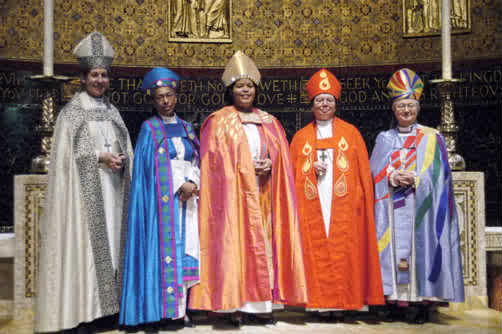Philip Turner hit the nail on the head when he wrote that underneath the trappings of traditional Christianity lies the true belief and "working theology" of the Episcopal Church in the US and it applies to large segments of the Canadians who share their Yankee cousins' Canterbury heritage: radical inclusion. Everyone must be affirmed and included (except those who refuse to affirm and include everyone). The thinly religious version of progressive egalitarianism. And a dead end. God as Mr. Rogers. (One might find that sexist, but Mr. Rogers was pretty much a girl.)
The meta-message it gives to Christianity's despisers, both cultured and uncultured, is that this church has such a dearth of self-respect that it has surrendered its right to exist and is desperate to please anyone, especially if they are outside the church. The internal anxiety and loss of confidence is palpable to anyone not inside the increasingly tiny bubble.
Funny how the ritual and sartorial froo-frah increases as any connection to actual historical Christianity fades.
As I say, Unitarians in drag.
What hath Cranmer wrought?
What hath Cranmer wrought?




3 comments:
Maybe the Australian Anglicans' idea of allowing lay people to consecrate the eucharist was only an internalization of the encyclical, Apostolicae Curae in which Pope Leo 12 said Anglican orders are invalid, don't result in real priesthood.
That is, the reasoning was:
Anglican clergy aren't real clergy.
But Anglican eucharists are real eucharists.
Therefore, lay people can consecrate the host.
Q.E.D.
It's a hope.
Re »the ritual and sartorial froo-frah increases as any connection to actual historical Christianity fades«: I wish it weren't so, but the attire evokes in me feelings of contempt. I'm not sure why this is. Colourful vestments on guys don't inspire respect in me, but I accept them matter-of-factly. (I've seen pictures of total popinjay vestments worn during church eras long past. Impossible not to have had to suppress a laugh even if guys wore them.)
The vestments aren't so different from a colourful evening dress as might be worn by women of a certain age and above. I accept that clothing matter of factly, and even approve of it as a way to express that one hasn't given up on one's femaleness. So I don't see why the ecclesiastical meaning of these vestments should evoke feelings of contempt.
Basically, though, dark colours are more serious, hence more in accord with authority. Male clergy are surely taken more seriously in dark than in colourful vestments. Presumably this holds for womengirls all the more so, because of their smaller size and higher voices.
Maybe there's also the sense that because female authority in the church occurs only in a liberational movement against all authority, therefore — "why are they still wearing the vestments of sacerdotal authority?" If you want power and authority, because females have their right to 50% of the power and authority, then fine, say that. Don't say you're making an egalitarian statement.
Yet that doesn't seem to be the reason, because, as I said, they would be taken more seriously as authorities (including by my psyche) if they wore serious black.
So is it that I can successfully make the effort to take seriously a guy who wears colourful vestments, but this effort can't succeed when a womangirl is inside such vestments?
Post a Comment